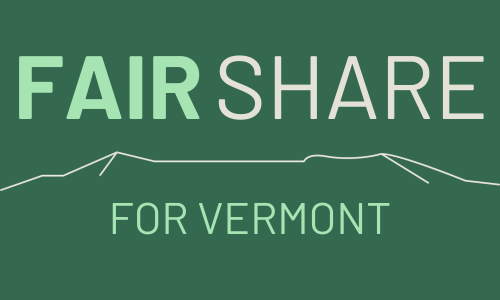Wealthiest Must Pay More in Taxes to Build a Better State for All
Statewide coalition introduces “Fair Share for Vermont” proposal to raise revenue, address community needs
FOR IMMEDIATE RELEASE
January 9, 2023
Contact: Anika Heilweil, Fund Vermont’s Future Campaign Manager, anika@publicassets.org
MONTPELIER, Vt.–– The state should adopt an income tax surcharge on Vermont residents earning more than $500,000 a year to better address the state’s most pressing needs in housing, social services, infrastructure, education, and the environment, a coalition of leading statewide organizations said today at a press conference.
The coalition, Fund Vermont’s Future, asserts that raising taxes on the wealthiest Vermonters will raise crucial revenue to address the needs of Vermont residents and communities. Fund Vermont’s Future will be working with legislators, local leaders, and other community members to pass the Fair Share for Vermont Proposal into law in the coming legislative session.
“It’s time for the wealthiest Vermonters to pay their fair share so we can build a Vermont that works for everyone who lives here,” said Lauren Hierl, Executive Director of Vermont Conservation Voters. “With that revenue, we can build a better Vermont with a healthy environment and clean water for all; where everyone gets the healthcare they need; where students can learn in outstanding public schools; and where our infrastructure is more resilient and can support a vibrant economy. And, making these much-needed investments can save us money in the long run.”
Coalition members detailed a list of pressing concerns facing Vermont communities, from lack of affordable housing and healthcare to environmental and infrastructure needs. The coalition underscored that the many challenges already facing Vermont were compounded by the pandemic and this summer’s flooding.
“Vermont families are struggling to make ends meet and the state has been failing to provide adequate services and support for too long,” said James Duff Lyall, Executive Director of the ACLU of Vermont. “The good news is that by making the wealthiest pay their faire share, we can start to address these challenges.”
Speakers today emphasized that when the state fails to raise revenue, the costs of supporting basic services and programs are passed on to low and middle-income taxpayers who can least afford it, while the current tax system protects the wealth of a small number of residents.
Stephanie Yu, Executive Director of Public Assets Institute, noted that Vermont’s income tax system has not kept up with skyrocketing incomes of the wealthiest Vermont residents. Said Yu: “Over the last decade, the share of income going to the top 1% of Vermonters has increased and more wealthy people have been moving into our state than out of it. At the same time, most workers have been squeezed by their wages not keeping up with the rising cost of basic needs. A more progressive revenue system will help fight income inequality and ensure the state can provide the services Vermonters need.”
Other states have passed similar measures in recent years to address worsening wealth inequality and fund essential programs. In 2022, Massachusetts voters approved a ballot measure to create a 4% tax surcharge on incomes over $1 million.
“The people of Vermont believe in fairness and they expect their elected representatives to meet this moment with action,” said Anika Heilweil, Fund Vermont’s Future Campaign Manager. “Asking the wealthiest Vermont residents to pay their fair share will make our state better for everyone, including our wealthiest residents.”
Fund Vermont’s Future is a statewide advocacy campaign dedicated to ensuring that the state budget meets the needs of all Vermont residents and that the state raises sufficient revenue to meet those needs.
The Fund Vermont’s Future coalition includes Public Assets Institute, the ACLU of Vermont, Vermont Conservation Voters, the Vermont Early Childhood Advocacy Alliance, Vermont Natural Resources Council, the Vermont-NEA, and Voices for Vermont’s Children, as well as individual representatives Alex Hilliard, Hamdi Jafar, and Amanda Janoo.
